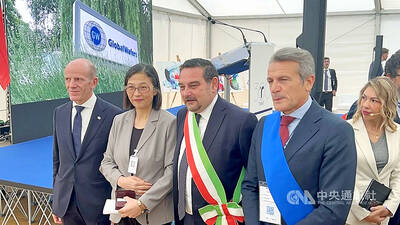The US remains the largest debtor at Taiwanese banks, with record exposure of US$113.28 billion in the second quarter of this year, the central bank said in a report on Wednesday.
Overall international debt at local banks was US$504.1 billion at the end of June, up 3.76 percent from the end of the previous quarter, the central bank said.
Exposure to US debt on a direct risk basis rose by US$11.8 billion on the back of increasing investment in the US market and Taiwanese deposits in US banks, it said.
Exposure on an ultimate risk basis — meaning consolidated debt after risk transfers — rose to US$108.83 billion from US$99.18 billion in the first quarter, the central bank said.
China remained the second-largest debtor, with direct risk-basis debt rising by US$3.3 billion to US$56.78 billion, the central bank said.
Borrowing by Chinese entities boosted ultimate risk basis debt to US$69.70 billion from US$68.98 billion, it said.
The central bank attributed the change to a strong Chinese yuan and increased investments after China brought COVID-19 outbreaks under control.
However, problems at property developer Evergrande Group (恆大集團) dampened Taiwanese banks’ willingness to invest in China, it said.
Luxembourg came in third at US$44.66 billion on a direct risk basis, followed by Hong Kong (US$35.06 billion), Japan (US$33.46 billion), Australia (US$25.48 billion), the Cayman Islands (US$20.15 billion), Singapore (US$15.91 billion) and the UK (US$13.99 billion).
Vietnam entered the top 10 for the first time at US$13.49 billion.
Taiwanese banks’ exposure to the top 10 debtors reached US$372.27 billion by the end of June, accounting for 73.85 percent of the country’s total outstanding international claims.

RECYCLE: Taiwan would aid manufacturers in refining rare earths from discarded appliances, which would fit the nation’s circular economy goals, minister Kung said Taiwan would work with the US and Japan on a proposed cooperation initiative in response to Beijing’s newly announced rare earth export curbs, Minister of Economic Affairs Kung Ming-hsin (龔明鑫) said yesterday. China last week announced new restrictions requiring companies to obtain export licenses if their products contain more than 0.1 percent of Chinese-origin rare earths by value. US Secretary of the Treasury Scott Bessent on Wednesday responded by saying that Beijing was “unreliable” in its rare earths exports, adding that the US would “neither be commanded, nor controlled” by China, several media outlets reported. Japanese Minister of Finance Katsunobu Kato yesterday also

‘DRAMATIC AND POSITIVE’: AI growth would be better than it previously forecast and would stay robust even if the Chinese market became inaccessible for customers, it said Taiwan Semiconductor Manufacturing Co (TSMC, 台積電) yesterday raised its full-year revenue growth outlook after posting record profit for last quarter, despite growing market concern about an artificial intelligence (AI) bubble. The company said it expects revenue to expand about 35 percent year-on-year, driven mainly by faster-than-expected demand for leading-edge chips for AI applications. The world’s biggest contract chipmaker in July projected that revenue this year would expand about 30 percent in US dollar terms. The company also slightly hiked its capital expenditure for this year to US$40 billion to US$42 billion, compared with US$38 billion to US$42 billion it set previously. “AI demand actually

Jensen Huang (黃仁勳), founder and CEO of US-based artificial intelligence chip designer Nvidia Corp and Taiwan Semiconductor Manufacturing Co (TSMC, 台積電) on Friday celebrated the first Nvidia Blackwell wafer produced on US soil. Huang visited TSMC’s advanced wafer fab in the US state of Arizona and joined the Taiwanese chipmaker’s executives to witness the efforts to “build the infrastructure that powers the world’s AI factories, right here in America,” Nvidia said in a statement. At the event, Huang joined Y.L. Wang (王英郎), vice president of operations at TSMC, in signing their names on the Blackwell wafer to

Taiwan-based GlobalWafers Co., the world’s third largest silicon wafer supplier, on Wednesday opened a 12-inch silicon wafer plant in Novara, northern Italy - the country’s most advanced silicon wafer facility to date. The new plant, coded “Fab300,” was launched by GlobalWafers’ Italian subsidiary MEMC Electronics Materials S.p.A at a ceremony attended by Taiwan’s representative to Italy Vincent Tsai (蔡允中), MEMC President Marco Sciamanna and Novara Mayor Alessandro Canelli. GlobalWafers Chairwoman Doris Hsu (徐秀蘭) said the investment marked a milestone in the company’s expansion in Europe, adding that the Novara plant will be powered entirely by renewable energy - a reflection of its